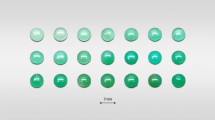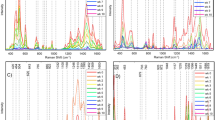Abstract
SORBY1 first described the pink pigment extractable from human red hair by hot acids, and its properties were further investigated by Flesch and Rothman2. In strongly acid solutions, the absorption curve shows a hump above 475 mµ with a maximum at 535 mµ (Fig. 1, curve 4), but this disappears at alkaline pH. Complete extraction of trichosiderin does not appreciably change the hair colour, and the contribution of this substance to the total pigmentation is uncertain.
This is a preview of subscription content, access via your institution
Access options
Subscribe to this journal
Receive 51 print issues and online access
$199.00 per year
only $3.90 per issue
Buy this article
- Purchase on Springer Link
- Instant access to full article PDF
Prices may be subject to local taxes which are calculated during checkout
Similar content being viewed by others
References
Sorby, H. C., J. Anthrop. Inst., 8, 1 (1878).
Flesch, Peter, and Rothman, Stephen, J. Invest. Dermat., 6, 257 (1945).
Smyth, J. R., Porter, J. W., and Bohren, B. B., Physiol. Zool., 24, 205 (1951).
Serra, J. A., Nature, 157, 771 (1946).
Author information
Authors and Affiliations
Rights and permissions
About this article
Cite this article
BARNICOT, N. The Pigment, Trichosiderin, from Human Red Hair. Nature 177, 528–529 (1956). https://doi.org/10.1038/177528a0
Issue Date:
DOI: https://doi.org/10.1038/177528a0
This article is cited by
-
Dopa and the Red, Brown and Black Pigments of Hair and Feathers**From the School of Human Genetics, University of New South Wales, Sydney
Journal of Investigative Dermatology (1969)
-
Die Feinstruktur des menschlichen Haares
Archiv f�r Klinische und Experimentelle Dermatologie (1968)
-
The Iron Pigment of Red Hair and Feathers**From the Department of Dermatology, Univer-sitv of Pennsylvania School of Medicine, Philadelphia, Pennsylvania 19104. This investigation was supported by Public Health Service Research Grant No. AM 10046-01 from the Division of Research Grants, National Institutes of Health.
Journal of Investigative Dermatology (1966)
-
Chromatographische Untersuchungen an Verschiedenen Genotypen vonPlodia Interpunctella im Vergleich mit Anderen Schmetterlingsarten
Zeitschrift f�r Vererbungslehre (1958)
Comments
By submitting a comment you agree to abide by our Terms and Community Guidelines. If you find something abusive or that does not comply with our terms or guidelines please flag it as inappropriate.



